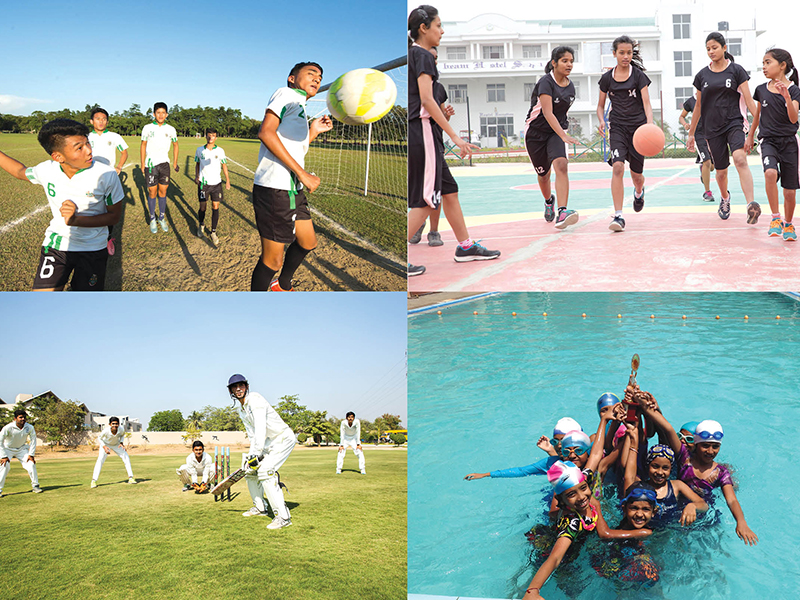No products in the cart.
Parents! Encourage children’s sports for personality development
The dominant belief is that the benefits of playing sports and games are limited to boosting fitness, strength and stamina. But that’s one side of the coin. On playing fields, children also develop leadership, teamwork and resilience — invaluable personality traits for success in industry and the professions. – Kiran Balimane & Cynthia John.
“Sports teaches you character, it teaches you to play by the rules, it teaches you to know what it feels like to win and lose — it teaches you about life” — Billie Jean King, American tennis legend and winner of a record 39 Grand Slam titles
Sportspersons, great and not-so-great all vouch that playing formal sports teaches valuable life skills, develops character, resilience, and leadership, among other capabilities. Not just sportspersons, political, military and corporate leaders attribute some of their success to lessons learned on playing fields.
The Duke of Wellington famously attributed his victory in the Battle of Waterloo to lessons he learned on “the playing fields of Eton”. Playing sports and games at this vintage British boarding school, he developed the qualities of leadership, discipline, teamwork, and resilience — vital for military success.
In India, parents tend to be over-focused on children’s academic learning outcomes. The dominant belief is that the benefits of playing sports and games are limited to boosting physical fitness, strength and stamina. But that’s one side of the coin. On playing fields, children also develop leadership, teamwork and resilience — invaluable personality traits for success in industry and the professions.
Numerous research studies have confirmed strong linkage between children’s sports participation and socio-emotional development. A study by Bidza-Bluma and Lipowska (2018) concluded that engaging in sports during childhood positively influences several cognitive development capabilities, including focus, creative thinking, and teamwork. Another study of Aspen Institute’s Project Play titled ‘The Social and Emotional Benefits of Youth Sports Participation’ (2017) concluded that participation in organised sports develops teamwork, leadership, and communication skills and reduces anxiety, particularly of shy children.
“Sports participation plays a transformative role in shaping children’s personality, extending benefits far beyond physical fitness. In team sports, children learn interpersonal skills, such as communication, collaboration, and empathy, the importance of working toward a common goal, respecting diverse perspectives and conflict resolution. Similarly, individual sports promote self-discipline, accountability, and intrinsic motivation, as children learn to become responsible for their progress and performance,” says Serah Menezes, Head of Mental Health in Sport at the Bengaluru-based Simply Sport Foundation.
A former nationally ranked tennis player and internationally certified tennis coach, Menezes is an evangelist of sports education which she believes positively impacts the social-emotional development of children. “Playing sports from early age enhanced my self-confidence and self-esteem. Surpassing milestones, however small, reinforced belief in my capabilities. Also interacting and playing with peers from diverse cultural and social backgrounds made me open to new experiences, respectful of diversity and developed my leadership skills. Sports participation should be mandatory for all children,” says Menezes.
The country’s board exams-obsessed parents who regard time devoted to sports as time taken away from the pursuit of academic excellence, need to know there is strong evidence to suggest that the opposite is true — that participation in school sports leads to improved academic outcomes. A recent University of Sydney (2023) study which reviewed 115 studies involving over a million students aged 9-18 concluded that sports participation has a positive impact on children’s academic learning and especially improves math and science scores. Similarly, another research study reported that 40 percent of children who engage in organised sports and games had higher test scores than their counterparts who didn’t play. The benefits of sports education extend into later life with student-athletes becoming more productive at work and earning 7-8 percent higher incomes than non-participants.
“Playing sports has an important positive effect on children’s cognitive growth. It makes them mentally strong, develops concentration, focus, improves attention spans and boosts self-confidence and self-esteem — all of which combine to positively impact academic outcomes. I strongly recommend that parents encourage children to play games whether within or outside school,” says Ayushi Srivastava, a Noida-based psychologist.
According to Srivastava, the formative years of six-12 are especially important to develop the determination, resilience, and competitive capabilities of children. “Encouraging children to play during their formative years enables them to develop these qualities while experiencing the enjoyment of play. Sports teaches individuals how to bounce back from failure and develop the virtues of persistence and resilience, useful not only in sports but also in academic and working life. Additionally, competition teaches children to strive for excellence and handle winning and losing gracefully. They acquire an understanding of fair play and the value of practice — necessary for success in academia and workplaces,” adds Srivastava.
Moreover, in the age of social media and digital addiction with a flood of data indicating that a growing number of children and adolescents are suffering mental health problems, encouraging children to play offers great benefits. Physical activity increases the production of endorphins, which are natural mood elevators; regulates cortisol levels (the stress hormone) and boosts serotonin, improving overall emotional well-being. A study published in the Journal of Physical Activity and Health (2017) highlights that participation in formal sports correlates with lower levels of depression and anxiety in children and adolescents.
Team sports in particular promote a sense of belonging and social support, which are protection against mental illnesses. A recent India-specific study (Dr. Brijendar Singh, 2023) found that children who played sports/physical activity managed stress better while also reporting a reduction in anxiety and depression.
The cognitive and social-emotional gains of playing sports apart, the “pure joy it gives to the mind” is an invaluable outcome of children participating in formal sports and games. “Play is a fundamental human instinct hardwired into babies. When kids play, they get fitter. When kids play, they display better peer relationships, attention spans and behaviour. When kids play, they get more disciplined. When kids play, they improve their emotional intelligence. When kids play, they improve their teamwork. When kids play, they understand and take instructions better. When kids play, they take more initiative. When kids play, they get better at overcoming difficulties and solving problems. When kids play, there is better community engagement. When kids play, they experience holistic development,” write Vijay Krishnamurthy, an alumnus of Bangalore University and New Jersey Institute of Technology, USA, sports research scholar and executive coach and Saumil Majmudar, co-founder and CEO of Sportz Village, one of India’s pioneer sports education companies in their book Get Kids to Play (Notion Press, 2023).
In this book, Majmudar and Krishnamurthy make a strong case for schools, educators and teachers to encourage children to play sports, highlighting that the benefits far outweigh parental fears of children missing a few hours of academic/tuition classes.
After wide consultation with sports evangelists, coaches and sportspersons, PW lists the benefits of sports play and education.
- Discipline. Playing formal/organised sports and games necessitates adherence to schedules, practice routines, and game rules, following guidelines and respecting authority, such as coaches and referees. This structure helps children develop the virtue of discipline. Moreover, regular practice and training teach children the importance of consistency, sustained effort, mental and physical focus, all of which enhance self-discipline. “The simple discipline of following the coach’s instructions and adhering to practice rules teaches children the importance of following the leader, an important life skill. Attending coaching sessions, maintaining a balanced diet, getting adequate restful sleep, daily exercise — all help children develop disciplined minds and bodies,” says Manoj Das, a Bengaluru-based gymnastics coach and former national gymnastics medalist.
- Resilience. Most formal sports and games require the adjudication of winners and losers. Over time, this teaches children to cope with disappointment and failure, the virtues of patience, perseverance, determination and resilience. “When children play formal games and sports, they encounter hurdles, setbacks, failures, which are character development experiences. Thus children build resilience — capability to cope with adversity. Additionally, competitive sports develop a growth mindset in children — to accept failure as an opportunity for self-improvement,” says Serah Menezes (quoted earlier).
- Goal-orientation. Playing and winning formal sports and games requires goal-setting. Coaches often break down larger into smaller goals enabling children to learn to track their progress towards acquiring greater competence. Learning goal-setting and tracking progress is a life skill likely to prove valuable in higher education and adult workplaces. “The difference between the impossible and the possible lies in a person’s determination. Sports are the perfect setting to teach children the importance of setting goals, working hard to achieve them, and understanding that success requires perseverance, not just talent,” says Tommy Lasorda, a former US Major League Baseball manager.
- Time management. When children play a sport competitively, they learn to juggle school, homework, practice sessions, sleep and entertainment. Comments US-based sports psychologist Dr. Roberta J. Rikli: “Athletes learn discipline and time management as they strive to balance their practice schedules, games, school, and family responsibilities. Sports require them to set priorities, follow a structured plan, and execute tasks efficiently.”
- Team-work/collaboration. Playing organised sports develops the increasingly important skill of team-work, collaboration and cooperation. Research from the American Psychological Association highlights that early engagement with field sports promotes awareness of collective responsibility, and the virtues of cooperation and collaboration to attain success.
“Playing team sports is the best way to learn teamwork. Coordinating with team players requires mind connection, quick-thinking and capability to adjust with others and complement their skills. When children play a team sport, this happens automatically, and they get into the habit of cooperating to achieve common goals,” says Pavana Uthappa, a Bengaluru-based basketball coach.
- Confidence. Playing any sport draws out shy and introvert children. Organised sports and games offer a structured environment where children cooperate with peers to attain a common objective. Success or even putting up a good show increases their confidence and self-esteem.
- Mental well-being. Physical exercise and activity improve children’s sleep and mental well-being. Play releases endorphins, often referred to as ‘happy hormones,’ which significantly enhances children’s mood and reduces stress.
- Social skills and relationships. The playing field is a great place for children to interact with peers and build inter-personal relationship skills. Participation in sports and games develops communication, cooperation and team-building skills, essential for success in all walks of life. “Team sports foster cooperation, socialisation, and friendship-building skills. Children learn to communicate effectively, respect teammates and opponents, and develop a sense of hard but fair play. I have seen children quickly learn social skills and make deep friendships on playing fields,” says Manikandan Chandra Shekar, Head Coach, Samsidh International School, Bengaluru.
Sports & play: Essential pathway for children’s growth
For several years, Dr. George Selleck, a San-Franciso-based author, sports psychologist, counselor, and coach, wrote a column on sports education for EducationWorld, PW’s affiliate magazine. Herein we present an excerpt from one of his columns where he highlights the importance of playing sports and games as essential pathway for children’s growth and development (see https://www.educationworld.in/play-essential-pathway-for-growth/).
“If you were to look up the dictionary definition of play, you will appreciate that play is a vitally essential pathway for kids on their journey of growth, and fulfillment of potential. Here’s a definition of play I found: Play, v. to occupy oneself in amusement, sport, or some other activity in which there is an opportunity to have fun, learn something, and make a mess.
However, play isn’t important only for three-year-olds. It offers opportunities for children of all ages to develop their motor and reasoning skill sets. That’s why it is so crucial to provide opportunities for children to participate in physical education and sports — because these activities give them the chance to ‘play and learn by doing’. Whether a child is a high-potential athlete or an average, awkward kid, she should have every chance to participate in games and physical activities to build values and learn skills such as teamwork, trust, discipline, dependability, and hard work.
For some strange reason, after a certain age, ‘having fun’ is never a good enough reason to do something. For most people, there has to be a defined objective, a definite goal. Without that goal, they think an activity is not worth pursuing. In sports, the opposite is true. Playing for the sake of playing and having fun has led to the development of some of the best players in the world. No world-beating athlete started running and playing with the objective of becoming a world-beater. They played for fun.
In the Bangalore-based firm EduSports with which I am associated, we believe that participation in physical activity and sports addresses health issues such as nutrition, obesity, and diabetes, and enables the growth of children and youth, which can be measured by way of physical, mental, social, and educational outcomes. These outcomes include:
- Being able to visualise more possibilities and opportunities in life
- Seeing problems in new and more revealing light
- Creating a common language for acting, working together and forging real relationships
- Regarding others as people worth interacting with rather than hostile competitors
- Relief from the stress of day-to-day routines
- Gaining the energy and enthusiasm to do great things
- Improving children’s ability to laugh at mistakes and applaud accomplishments together
Moreover engaging in sport teaches children numerous life skills. Parents need to understand that by letting children face on-field and in-arena challenges, they are preparing them to confront the greater and larger hardships of life. So if you really want your child to learn to work hard, enable and facilitate her to play hard. Otherwise you will be robbing your children of special opportunities that may never come their way again.”



















Add comment